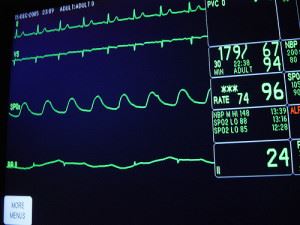
The Joint Commission, an independent accrediting body for health care organizations, has just released a “Sentinel Event Alert” related to the on-going problem of hospital staff failing to respond to alarms on patient monitors. Entitled “Medical Device Alarm Safety in Hospitals,” the bulletin is aimed at helping hospitals to institute safety procedures for the use of medical devices with alarms.
Monitoring technology has become ubiquitous in hospitals, starting with the fetal monitoring machines that monitor unborn babies’ heart rates during labor through heart and oxygen monitors that keep track of critically ill patients. While these machines provide important information to health care providers, their widespread use has created a number of problems.
The most widely reported problem is so-called “alarm fatigue”–the phenomenon where busy providers, bombarded with multiple alarms, are slow to respond to the sound. The reasons for this are many, ranging from understaffing, to a high number of false positives, where the machine alarm sounds when there is really no danger to the patient, to providers simply tuning out a sound that is a part of the normal environment. Virtually anyone who has ever sat in an intensive care unit with a family member has witnessed delays or even failures in responding to machine alarms. It can be terrifying to patients and families, and as the Joint Commission points out, it can even be life-threatening.
Because alarms are so frequent, particularly in intensive care settings, the Joint Commission notes that “clinicians may turn down the volume of the alarm, turn it off, or adjust the alarm settings outside the limits that are safe and appropriate for the patient – all of which can have serious, often fatal, consequences.” The Commission suggests a series of steps that hospitals can use to ensure that patient alarms are properly set so as to minimize false readings, and that providers are able to hear the alarms and respond in a timely fashion.
When a patient suffers injury or death in a hospital, alarm errors can be very difficult for families to identify, as medical records often do not record what monitors are being used, what parameters are set, whether and when an alarm sounded, and whether and when a provider responded to the alarm. Some cases come to light when the hospital admits to the patient or family–usually following some sort of adverse event–that there was a problem with the monitoring, while others are uncovered during discovery in a lawsuit, when a health care provider admits in response to specific questions that a monitor was ignored or turned off.
The ability of patients to obtain data from malfunctioning or ignored monitors varies greatly. Some monitors have no internal storage of data, while others save information only for a relatively short time. Some types of monitoring records are saved by hospitals, but not considered part of a patient’s record, and must be specifically requested–often only after a lawsuit is filed. This data, if available, often provides important insights into what happened during crucial times in a patient’s care.
Read more: The Boston Globe recently published an article discussing the risks to patients from “alarm fatigue.”
